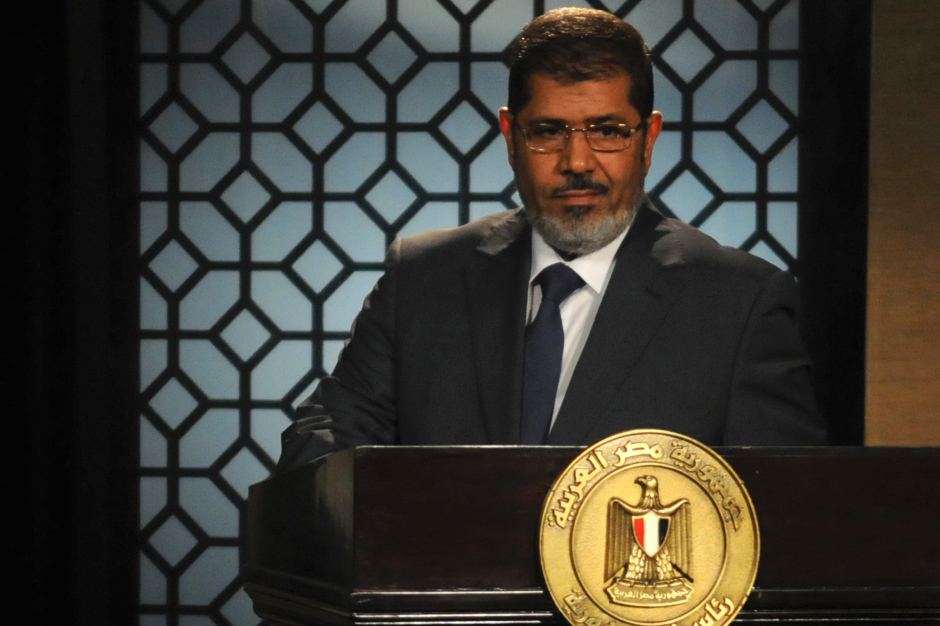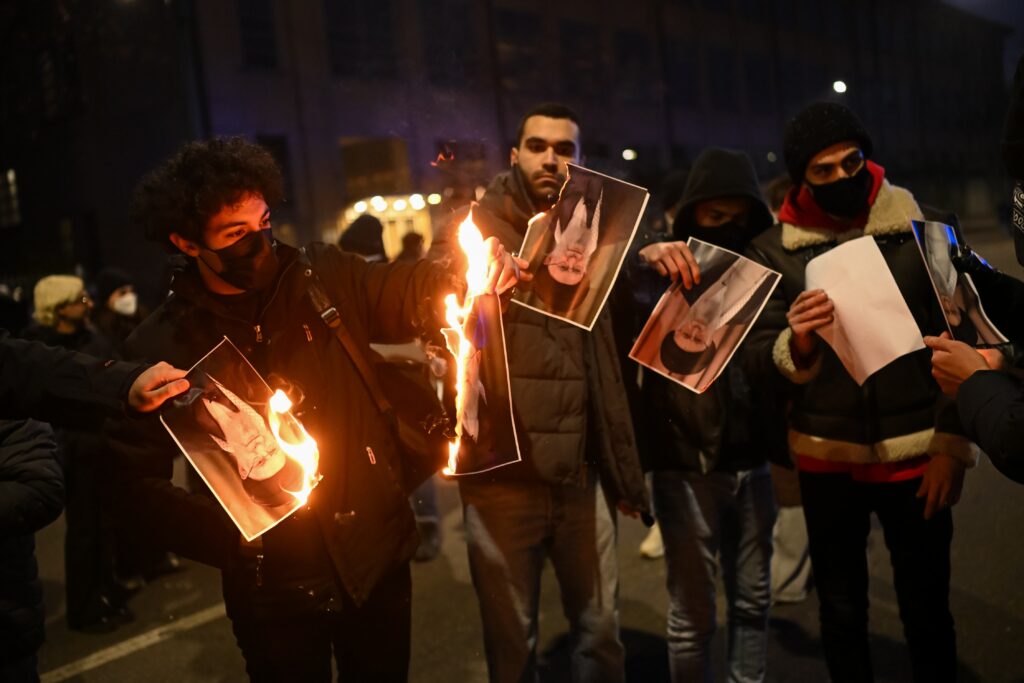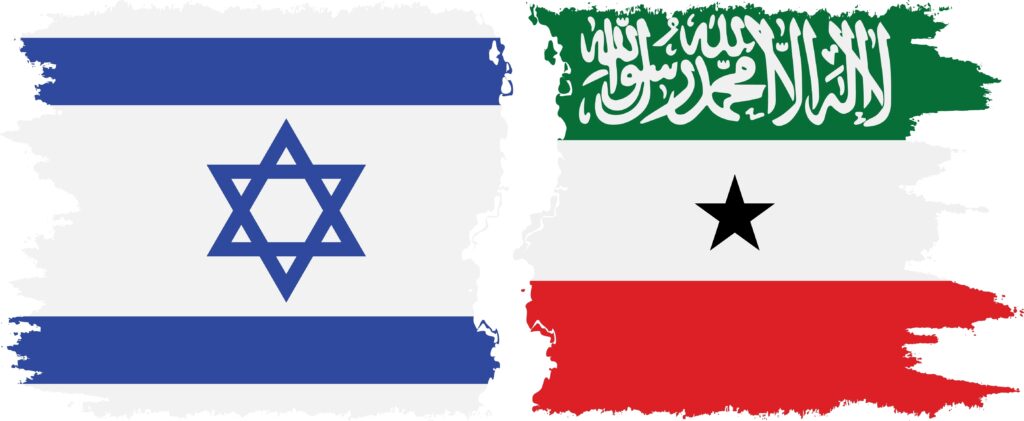UPDATES
Morsi’s “coup” against the military in Egypt
August 15, 2012

Update from AIJAC
August 15, 2012
Number 08/12 #04
This Update deals with the dramatic announcement by Muslim Brotherhood Egyptian President Mohammed Morsi made on Sunday, firing the defence minister and all the heads of the armed forces – the major competing centre of power through the transitional military council SCAF – and also heavily strengthening his own constitutional power via a decree altering the interim constitutional arrangements.
First up is an analysis from Time magazine, which asks if the move amounts to a “coup” against the military. In the story, Time‘s Abigail Hauslohnerconsults local experts who note that the Muslim Brotherhood is clearly calling the shots, not Morsi, and this move it likely part of a detailed plan on their part. The story also notes that the move is extra-legal (though legality is murky at the moment with no firm constitution in place) and gives Morsi effective dictatorial powers – moreover, recent appointments also gives the Brotherhood strong influence over the country’s media (which is largely government-controlled). For this look at all that has happened in Egypt over the weekend and what it might mean, CLICK HERE.
Next, Michele Dunne, an expert at the Atlantic Council’s Rafik Hariri Centre for the Middle East, looks in more detail at what she describes as stage three of a detailed “coup” plan to gain power on the part of Morsi and the Brotherhood. She looks at a series of possibilities for the future – a pushback by the military (which is now looking less likely), the court overturning the key decree, and, if Morsi’s moves stand, whether they will be seen as simply removing the last elements of the Mubarak regime, or are a prelude to an Islamist “putsch”. She urges observation over coming months of Morsi’s treatment of the Supreme Court, and the process of drawing up the Constitution to see which it is – to read the rest of what she has to say, CLICK HERE. US official turned analyst Elliott Abrams also calls for a focus on Morsi’s behaviour with respect to Sinai and Gaza as a key to understanding his intent. Meanwhile, another analyst from the Atlantic Council, Nancy Messieh, notes that on paper Morsi now has more power than Mubarak or Tantawi ever did, but the military seems to be acquiescing to the latest moves.
Finally, Washington Institute expert David Schenker looks at the legal and constitutional side of Morsi’s move. He notes that Morsi’s decree stripping the military of the powers it previously had and giving them to himself goes against the constitution approved overwhelmingly in a referendum in March 2011. He argues that Morsi’s manoeuvre “threatens to undercut the legitimacy of the constitutional transition process and the foundations of Egypt’s fledgling democracy” and may well be successfully challenged in Egypt’s supreme court, the High Constitutional Court. For all the details, CLICK HERE.
Readers may also be interested in:
- Former Israeli Ambassador to Egypt Zvi Mazel is puzzled that Western states don’t seem to realise that ” Morsy’s Egypt is a new country, with a new religious agenda that it is eager to implement.”
- Barry Rubin argues that the erosion of the ability of the military to resist the Muslim Brotherhood’s plans for Egypt has occurred even faster than pessimists like himself had predicted and also focuses on the erosion of media independence. Meanwhile, Martin Kramer notes he predicted the military would not slow down the Brotherhood’s plans for long a couple of months ago.
- A profile of Egypt’s new top general, Gen. Abdel-Fattah el-Sissi, who has long-standing ties to US counter-parts, but is known in the military for Islamist sympathies.
- Articles on the likely effects on Israel-Egypt ties of the military changes in pieces from Alex Fishman of Ynet and Gabe Fisher and Stuart Winer of the Times of Israel.
- An interesting podcast from the Tel Aviv University’s Dayan Centre for Middle East Studies on the Islamisation of Egyptian society.
- In the wake of the Sinai clash last week, the Palestinian Authority calls for Egypt to close down all smuggling tunnels from Gaza into Sinai. Plus, former AIJAC analyst Daniel Mandel argues that Israel should be re-asserting military control over the Gaza-Sinai border, the so-called “Philadelphi corridor.”
- Analyst Tony Karon considers the possibility that the violence in Syria means that the Golan will become a similar source of extremist terrorism to Sinai.
- An eyewitness report from Aleppo, which is being described by some as Syria’s Stalingrad. More good analysis of the military situation in Syria is here, here, here and here.
- Another good analysis of Russia’s calculations in backing Assad.
- A piece on Hezbollah’s discomfort, and potential political damage, following allegations that several supposed “pilgrims” kidnapped by rebels in Syria are Hezbollah officials. More on the tensions over the 48 “hostages”, whom rebels claim are all affiliated with the Iranian Revolutionary Guard, Basiji militia, or Hezbollah.
- Meanwhile, in what is perhaps a sign of growing Lebanese independence from Syria and its Hezbollah allies, Lebanon indicts Syrian officials and a pro-Syrian former Lebanese cabinet minister for seeking to murder political opponents in Lebanon.
- Some examples from the many stories and comments now appearing at AIJAC’s daily “Fresh AIR” blog:
- Daniel Meyerowitz-Katz on the intense debate in Israel and in Washington now about a possible military strike on Iran’s nuclear program.
- Or Avi-Guy writes about Iranian efforts to exclude women from many university courses and Saudi plans to build cities exclusively for women.
- Allon Lee’s latest media week column.
Notice: Now Available- “FreshAIR by Email”
AIJAC is now offering an additional new service free of charge. You can now receive our FreshAIR blog, offering news and analysis on a daily basis, as events happen, by email. This is in addition to the Facebook, Twitter and RSS access already available. To get “FreshAIR by email”, simply send an email to FreshAIR-subscribe@aijac.org.au and reply to the confirmation email you will receive. (You can unsubscribe anytime by simply emailing FreshAIR-unsubscribe@aijac.org.au). Or just visit our sign-up webpage here.
Has Egypt’s Muslim Brotherhood Staged a Coup Against the Military?
Time, August 12, 2012
It would seem that Mohamed Morsy is on a roll. Less than a week after sacking several major security chiefs, the first elected President in Egypt’s history has moved on to tackle the big guns. On Sunday, Morsy fired Field Marshal Mohamed Hussein Tantawi, the country’s Defense Minister and powerful chief of Egypt’s military council, with whom the President has been locked in a power struggle since he took office at the end of June. Perhaps no more.
Along with Tantawi, who in the 18 months since the ousting of President Hosni Mubarak has reigned as the most powerful man in Egypt, Morsy sacked his chief of staff, Sami Anan. He fired the head of every service of the armed forces and nullified the June constitutional decree that Tantawi and Anan’s Supreme Council of the Armed Forces (SCAF) had released to seize more power for itself. Morsy also appointed a much anticipated Vice President: Mahmoud Mekki, a prominent reformist judge.
If all that comes as a shock to many Egyptians — the Ramadan-subdued streets of Cairo flickering to life with murmurs of excitement shortly after the announcement — it wasn’t a shock to everyone. That includes the military council. General Mohamed al-Assar, a ranking member of SCAF, told al-Jazeera that Tantawi and Anan’s dismissal came through consultation with Morsy. Analysts say that’s because there was a deal involved. “I think the deal is [Tantawi and Anan] get a safe exit, and they hand the country to the Muslim Brotherhood,” says Mamdouh Hamza, a prominent businessman and pro-democracy advocate. “Because quite honestly, if we apply the same law [to the generals] that we applied to Mubarak’s family, Tantawi would be behind bars.”
The notion that immunity may have been exchanged for power troubled some of the country’s liberal youth as well, even as many other Egyptians flocked to Cairo’s Tahrir Square to celebrate what appeared to be the end of an era. “Morsy clearly won’t prosecute any murderers or torturers,” quipped Gigi Ibrahim, a young activist, on Twitter, following the announcement.
But the bigger picture is this, Hamza says: the reshuffle plays into the broader strategy of Morsy’s powerful Islamist alma mater, the Muslim Brotherhood, which most analysts agree is still calling the shots in the presidential kitchen. “They are the only ones in the kitchen, 100%,” says Hamza. “In fact, Morsy might only be the coffee boy in the kitchen.”
Long the only significant challenge to Mubarak’s 30-year rule, the Muslim Brotherhood emerged from last year’s uprising primed to become the largest political force. Its representatives won the lion’s share of parliament; and ultimately, it took the presidency too.
Sunday’s shift marks Morsy’s boldest move yet to reclaim power from the country’s powerful military council. But it follows a similar reshuffle last week in Egypt’s security sector, which included the ousting of an old regime ally, Mourad Mwafi, from the head of the country’s General Intelligence Service. The replacements in the security sector, and indeed in the military, all serve a purpose in the broader scheme of things, analysts say. “The Muslim Brotherhood doesn’t do anything off the cuff. Everything is according to plan and may be known for a few months before,” Hamza says
Tantawi’s replacement, Abdel Fatah el-Sissi, is rumored to be a deeply religious man — perhaps the closest thing on the council to a Brotherhood ally. The new Vice President, Mekki, a top judge, was an early — but secret — Brotherhood pick for the presidency, according to Mohamed Soudan, a high-ranking Brotherhood official in Alexandria.
Along with Morsy’s newly appointed Justice Minister, Mekki will be a valuable asset as the country moves forward in drafting a new constitution. And according to Robert Springborg, an expert on the Egyptian military and a professor at the Naval Postgraduate School in California: for every new hire — perhaps regardless of origin — Morsy and the Brotherhood gain an ally. “It’s Morsy and the Muslim Brotherhood who appointed them,” he says. “So their political careers are dependent on Morsy.”
Indeed, that may also be true for the new editors in chief of the country’s state newspapers — appointed last week by the Brotherhood-dominated upper house of parliament, the Shura Council.
The Brotherhood, analysts say, is slowly and deliberately arranging Egypt’s political chessboard. “They had to make sure that the media is in their hands and that the army is under their control before they go and make major changes in the Ministry of Justice and in the justice system,” says Hamza. “The next step will be the new constitution.”
The bold moves, particularly Morsy’s annulment of the military council’s June addendum to Egypt’s constitution — which had granted the military full legislative and certain executive powers — raises some questions of legality, experts say.
“It’s extralegal,” says one foreign NGO worker in Cairo, who has charted similar declarations by the military over the past 18 months. Morsy didn’t nullify all of SCAF’s decrees — only the aspects that hindered presidential power. Whereas the military had, in June, claimed full legislative authority following the Supreme Court’s dissolution of the parliament, Morsy now claims legislative control for himself. He also seized the right — from the generals — to dissolve and replace the committee tasked with drafting Egypt’s new constitution, if the committee is somehow “prevented from doing its duties,” the state-backed Ahram Online news website reported.
Egypt’s powerful generals have largely ignored Egyptian law ever since they issued their first constitutional decree in February 2011, two days after Mubarak stepped down, the NGO official points out: “So why can’t Morsy do it too?” Last February, SCAF suspended Egypt’s 1971 constitution. “They did this to legitimize their own power,” the official adds, because the constitution had stipulated that in the absence of a President, power be handed to the head of parliament or the head of the Supreme Court. Tantawi and his generals had ensured that wouldn’t happen.
But now Morsy may be following in their footsteps. The Islamist President appears — “on paper” at least — to have suddenly amassed “dictatorial powers,” writes Issandr El Amrani, a regional analyst, on his popular blog, the Arabist. For a country still struggling to shrug off the entrenched influence of its military after more than half a century of military rule, that might not be such a terrible thing, El Amrani and other analysts note. Hamza says it’s an important first step in dismantling a junta; if Morsy can remove the military from business and the public sector too, Egypt will be on its way to success, he says. But there’s no telling just how the President and the Brotherhood will move next. As for the paradigm shift and the new powers it seems to entail, says El Amrani: “It will largely come down to how he uses them.”
— With reporting by Caroline Kolta / Cairo
Back to Top
————————————————————————
Egyptian President Morsi’s Counter Coup, Move Three
Michele Dunne
Atlantic Council, August 12, 2012
With a bold decree canceling the June 17 Supplementary Constitutional Declaration that limited his powers just before his inauguration–as well as a spate of new senior appointments eliminating senior leaders of the Supreme Council of the Armed Forces (SCAF) and promoting more junior SCAF members–President Mohammed Morsi appears to be using last week’s Sinai crisis as an opportunity to implement a broader plan. What is not yet clear is whether he will succeed to a greater degree than he did with an earlier part of the strategy.
Morsi has now sacked Mohamed Hussein Tantawi, Minister of Defense since 1991 and de facto president since Mubarak’s departure, and Chief of Staff Sami Enan (often seen as almost equal to Tantawi in power), giving them medals for service and making them presidential advisors. Morsi also replaced the heads of the air force and navy. The new defense minister is SCAF member Abdel Fattah al-Sisi, former head of military intelligence, and the new chief of staff is former army commander Sidqi Sobhi (also from the SCAF). Morsi named Mohamed al-Assar, third in command in the SCAF, as “Assistant to the Minister of Defense,” an office al-Assar technically already held. Al-Assar’s mention might be read as a signal of reassurance to the United States, as he has been responsible for handling military relations with Washington for years.
Morsi appointed as vice president Mahmoud Mekki, a senior judge who was a tireless crusader for judicial independence in 2005-6 and paid the price of discipline under the Mubarak regime. Mekki’s brother Ahmad, also an activist judge, was recently appointed Minister of Justice. All of these new choices are respected senior officials–although the new Defense Minister is tainted by his justification of the use of virginity tests in 2011 during the questioning of female detainees (which he claimed were necessary to protect military officers from accusations of rape)–and none is publicly affiliated with the Brotherhood, although some are reported to have Islamist leanings.
While the appointments are getting the most media attention, Morsi’s decree—in which he seized not only full presidential but also legislative powers—is at least as important. By canceling the June Supplementary Constitutional Declaration, Morsi reinstated presidential authority over defense appointments and military affairs, and also removed the SCAF’s veto over articles in the new constitution. He also did something more profound, which was to amend the March 2011 Constitutional Declaration, basically removing all executive and legislative powers from the SCAF and transferring them to himself, at least until there is once more a parliament to retake legislative authority.
Morsi’s latest steps are the third move in a strategy to remove some of the remaining components of the Mubarak regime. His first move, a July 9 decree that attempted to reinstate the lower house of parliament dissolved by court order, has not really been implemented. The parliament met once and then referred its fate to the courts, which have not acted on the matter yet. Morsi then moved into a mode of cooperation with the SCAF for several weeks that suggested he knew he had overreached, but now it seems he was merely waiting for another opportunity.
The military and intelligence failure inherent in the Sinai attack in which 16 Egyptian soldiers were killed provided Morsi with the space to make move two, which was the sacking of General Intelligence Director Mourad Mouwafi and several other senior security officials. And the success of that step, welcomed by most observers as implementing a degree of accountability, seems to have paved the way for move three, the boldest so far.
There are several possibilities for how Morsi’s move will play out over the coming days and what it will mean for the long term. The immediate question is whether Tantawi and Enan will step aside or will strike back at Morsi, either immediately or later on. That might depend on whether more junior members of the SCAF—al-Sisi, Sobhi, and al-Assar—cooperated with Morsi against Tantawi and Enan. If not, another military coup could take place. Another possibility is that Morsi’s decree will be challenged in the courts and his appointments overturned. Either of these scenarios would be likely to lead to violence between military and Brotherhood supporters.
If Morsi’s moves stand, it could be months before it is clear where they will take Egypt. Optimists on Twitter August 12 were saying that Morsi was finally removing the dregs of the Mubarak regime and would now implement the goals of the 2011 revolution. Certainly it would have been difficult, perhaps impossible, for Morsi to be an effective president under the constraints the SCAF had set up for him. But there is also the possibility that Morsi will move beyond the caution of his early appointments to bring more and more Brotherhood members or sympathizers into senior positions, carrying out the putsch that many have feared.
One development to watch closely is the fate of the constituent assembly, which was selected by the parliament and is working on a new draft constitution while facing a lawsuit that could end in its dissolution. Morsi has now seized from the SCAF the prerogative to appoint a new assembly should this one be dissolved. Another area to watch is senior judicial appointments; there have been rumors that Morsi will act soon to change the composition of the Supreme Constitutional Court, as some of the judges have sided with the SCAF against Morsi. Either of those steps would set off a new round of alarm bells in Egypt and beyond.
Michele Dunne is the director of the Atlantic Council’s Rafik Hariri Center for the Middle East.
Back to Top
————————————————————————
In Egypt, Rule by Constitution or Fiat?
David Schenker
Policy Alert, August 13, 2012
This weekend, Egypt’s Islamist president Muhammad Morsi unilaterally amended the interim constitution that had been approved by 77 percent of voters during a public referendum in March 2011. Although these changes may eventually be challenged in the High Constitutional Court (HCC), the absence of a parliament and military leaders capable of intervening means that there are few if any checks on Morsi’s powers at the moment.
In addition to axing long-serving Defense Minister Muhammad Hussein Tantawi and Chief of Staff Sami Anan, thereby weakening the military’s authority, Morsi amended the constitution to give him powers that had been the sole purview of the Supreme Council of the Armed Forces since Hosni Mubarak’s ouster. First, he abrogated the SCAF’s June 17, 2012, constitutional addendum, which had stipulated no civilian oversight of the military and allowed the council to appoint the next Constituent Assembly to draft the constitution.
More significantly, Morsi assumed powers granted to the SCAF under Article 56 of the interim constitution, including the right to “legislate” (i.e., set down new laws), to “issue public policy for the state and the public budget and ensure its implementation,” to “sign international treaties and agreements,” and to “appoint civilian and military employees and political representatives.” Egyptians had given these powers to the SCAF via the March 2011 referendum.
The HCC’s initial reaction might suggest a future constitutional challenge to Morsi’s maneuver. Several judges on the court have already condemned his overreach — as Tahani al-Gebali told Ahram Online, “A president does not have the power to abrogate a constitution, even a temporary one.” The HCC’s current head was appointed by the SCAF in July, and less than three months ago, the court declared the results of the earlier Islamist-dominated parliamentary elections unconstitutional. Another momentous decision along those lines could be forthcoming.
Essentially, Morsi has changed Egypt’s constitution by fiat and, in the process, afforded himself control over the military, all legislative powers, and the makeup of the assembly that will write the new constitution. Although the SCAF’s management of the transition was inept and halting, it was at least seemingly guided by some constitutional principles. Morsi’s maneuver, if it stands, threatens to undercut the legitimacy of the constitutional transition process and the foundations of Egypt’s fledgling democracy. While curtailing military power may prove popular in Tahrir Square, the constitutional ramifications will likely prolong instability in a country already beset by significant economic, security, and political challenges.
David Schenker is director of the Program on Arab Politics at The Washington Institute.
Tags: Egypt





